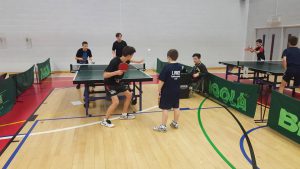
How should you play doubles in table tennis depending on the strength of your partner?
Now this is a very interesting question. A lot of players fall into the trap of thinking that if their doubles partner is stronger than they are, then they should play very conservatively and let their superior partner do all of the attacking. Vice versa if their doubles partner is weaker than they are, then they feel pressured into doing all of the attacking. Although these thought processes do have some merit behind them, the actual answer to the question is actually a lot more complicated than that.
How you should play depending on your partners skill level is actually very dependent on the skill gap between the individuals involved. For instance, if a local league player is playing with a top national player, then the local league player should focus solely on getting the ball on the table without playing many risky shots at all. This however, would be very different if it was a pairing consisting of two local players, with one being only 10% better than the other. If this was the case, the lesser player should have more of an input and play more aggressively than he would if he was playing with the national team player used in the previous example.
Another situation that can occur in a doubles pairing is that the better player can sometimes be much less aggressive than the weaker player, whereby the better player usually wins through having great consistency, and not giving their opponents many attacking opportunities. In this case, if the weaker player does have a more aggressive and offensive style, they may actually need to be the one who takes more risks. In this case it would be the job of the superior, yet more defensive player to open up opportunities for their lesser, more aggressive partner to get in and attack. At the very least they should be making it easier for the lesser player to be more consistent.
Another major problem with taking the “I’m a worse player so I shouldn’t attack” mentality, is that it can sometimes put too much pressure on the better player. This then can lead them to be overly aggressive, and attempt unnecessary, high-risk shots. So make sure, even if your doubles partner is vastly superior to you, that your shots have a purpose to them. Even if you just play a block, at least make sure its a solid block with good placement and purpose so that your partner doesn’t have to all of the work.
To conclude, whatever your doubles partners standard, make sure that you have a basic game plan and that you each have a clear role before the match starts, taking in to consideration some of the points detailed above.
